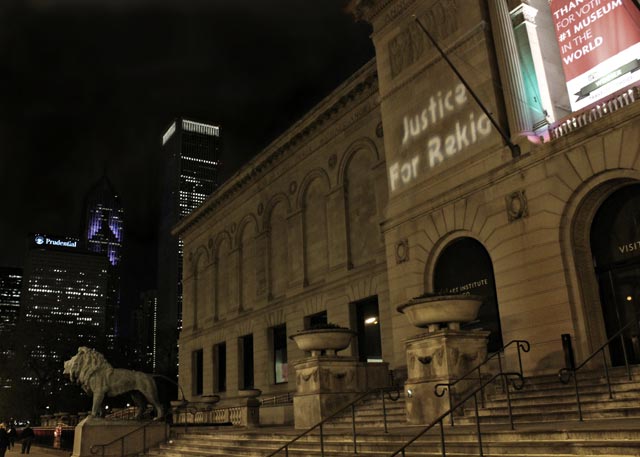
Honest, paywall-free news is rare. Please support our boldly independent journalism with a donation of any size.
“We do this for Marissa! We do this for Tanesha! We do this for Mike Brown! We do this for Rekia! We do this for Damo! We do this till We Free Us!” – Black Youth Project 100 protest chant
This week, the trial of Dante Servin began in Chicago. Of the many people who are shuffled through our courts each week, Servin has the unlikely distinction of being a Chicago police detective who was actually charged with a crime after gunning down a Black woman. No reasonable person could question the egregiousness of Servin’s behavior. Upset about the amount of noise he claimed a group of young people were making in a nearby park, Servin recklessly fired over his shoulder at a crowd while sitting in his car. Rekia Boyd died less than 24 hours after being struck in the head by one of the five rounds Servin fired.
It is important to note that the even these circumstances, by themselves, would not have been enough to bring Servin to trial. It has taken years of advocacy and struggle on the part of Rekia’s family, and their supporters, to bring this matter to the brink of some legal resolution. Their dedication in pursuing this case has been unwavering, but even with the facts and the law on their side, they have entered this stage of the legal process knowing that facts and the law are rarely enough to convict a police officer. All the same, they remain steadfast in their commitment to taking their fight, waged in Rekia’s name, the last mile of the way.
Not long before the trial began, members of The Chicago Light Brigade and local organizer Brit Schulte spoke to Rekia’s brother, Martinez, about how his family was coping, and how we could best honor their struggle. “My sister was murdered,” he said. “Murdered right behind the detective’s house. And the only thing that they can tell us is that she’s innocent. It hurts every time we talk about it because we miss her so much. She was such a lively and vibrant spirit.”
Yesterday, I read a piece by my friend Mariame Kaba, who had attended a rally for Rekia earlier in the day, just before Servin’s trial began. Her words struck a painful chord with me, and with many who organize around issues of police violence:
“There is in fact a hierarchy of oppression as Black women, Black trans and gender nonconforming people have even less access to limited sympathy than do cis heterosexual Black men. To deny this is to be a liar. When we call out ‘who will keep our sisters?’ too often we are greeted with one or two lone voices in the wilderness but usually with silence.”
As an indigenous woman, whose murdered sisters are far too easily forgotten, and as someone who worries daily for my Black friends in this city, I felt those words deeply. I wanted to reach out to Mariame, and offer her some words of comfort. I wanted to say something to comfort us all, as we continue to process so much violence and resist so much forgetting. But I could not. If there were any words for such a moment, they weren’t mine to say.
But tonight, after a great deal of discussion and reflection, my friends and I decided to offer what we could to those who are mourning, discouraged, and in need of hope. We decided to offer a bit of light and action, in the hopes that seeing a message for Rekia projected in the night sky, in the heart of our city, might make them feel a little less disheartened, and a little less alone. It’s a small offering, to be sure, but it is one that is made with love, and with a great deal of hope.
 (Photo: Kelly Hayes)
(Photo: Kelly Hayes)
We know our friends and allies are tired, and that our shared struggles can strain even the most resilient among us, but we also know that what we are doing together matters, and must continue. As the young organizers of Black Youth Project 100 so poetically remind us, “We do this till We free us.”
Press freedom is under attack
As Trump cracks down on political speech, independent media is increasingly necessary.
Truthout produces reporting you won’t see in the mainstream: journalism from the frontlines of global conflict, interviews with grassroots movement leaders, high-quality legal analysis and more.
Our work is possible thanks to reader support. Help Truthout catalyze change and social justice — make a tax-deductible monthly or one-time donation today.